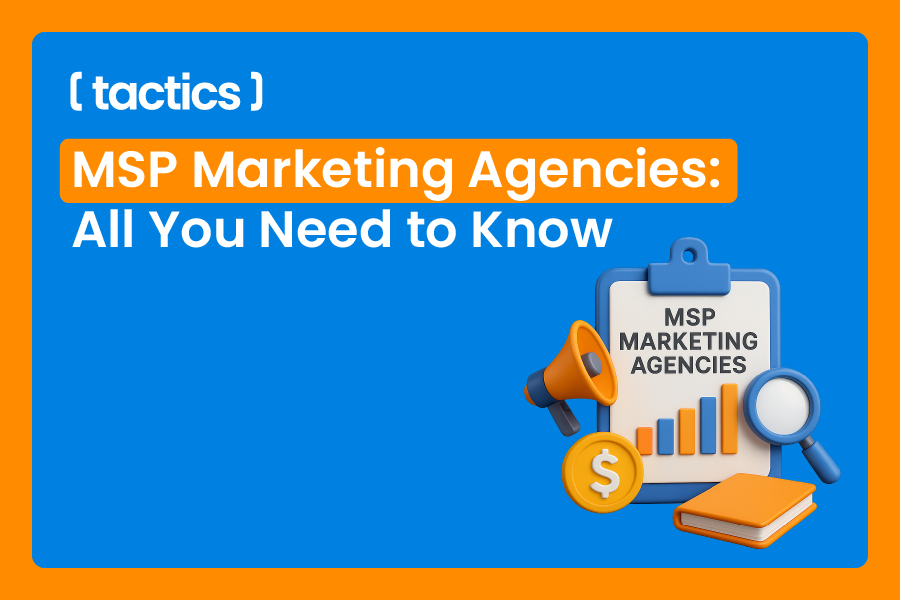MSP Marketing Agencies: All You Need to Know

For Managed Services Provider's, marketing needs much more effort than just brand polishing. MSPs need to focus on pipeline clarity as well, more than other industries.
Whether you're chasing net-new leads or trying to stay relevant in a noisy vendor ecosystem, the right message, channel, and timing can directly impact deal velocity.
But most marketing programs fall apart because they’re too generic, too detached from sales, or managed by people who don’t understand the MSP space. That’s where MSP marketing agencies come in.
The right MSP marketing agency will help you map directly to your tech stack, buyer journey, and growth targets. This piece unpacks what a good MSP-focused agency looks like, what separates real operators from the noise, and how to evaluate them before they start burning hours. Let’s get into it:
Why Traditional Marketing Fails for MSPs
Traditional marketing fails MSPs because it treats technical services like consumer products, reducing complex solutions to surface-level messaging.
It misses the layered decision-making behind B2B tech sales, where buyers weigh in other factors like compliance, integration, and long-term support. For MSPs, campaigns often sound polished but lack context, making them unusable for sales teams trying to close real deals.
What a Good MSP Marketing Agency Does
With almost 90% of SMBs either using or considering an MSP, the demand is there. But that also means competition is rising fast. A capable agency can help position you as the trusted option in a crowded space, especially when your prospects are comparing multiple providers at once.
Experienced MSP marketing agencies plug directly into your existing systems—whether that’s HubSpot, Salesforce, or another stack—and work with your pipeline, not around it.
Instead of chasing vanity metrics, they focus on generating leads that match your ICP, align with your buying cycle, and convert faster. Their playbook isn’t borrowed from generic B2B marketing. It’s built for the nuances of MSP sales.
They create traction through:
-
Industry-focused SEO that ranks for terms your prospects search
-
Email sequences are designed to warm up leads, not just fill inboxes
-
Webinars and gated assets that double as lead magnets and qualification tools
They also own the heavy lifting on:
-
Messaging that’s technically accurate and commercially sharp
-
Funnel structuring that mirrors your sales model
-
Lead scoring tied to intent
-
Reporting that surfaces the real revenue impact
Red Flags to Avoid When Hiring One
Not all MSP marketing agencies that say they work with MSPs understand what that means. Flashy decks and big claims are easy to fake—revenue impact isn't. Here are the warning signs that should stop you before contracts are signed:
-
Buzzword overload with no measurable KPIs: If everything sounds impressive but nothing ties back to MQLs, SQLs, or revenue, you’re looking at smoke and mirrors. Ask how they track success, and expect specifics
-
No experience in B2B or tech sectors: Marketing IT services isn’t the same as pushing SaaS or DTC brands. Without B2B muscle memory, the agency won’t speak your buyers’ language
-
Outsourcing technical content to generalists: When whitepapers or blog posts feel shallow, it’s usually because they are. MSP marketing agencies that farm out content to generic freelancers can't produce credible messaging that sells technical solutions
-
No understanding of partner marketing or reseller/vendor ecosystems: MSPs often work inside complex channel models. If your agency doesn’t get MDFs, co-branding, or distributor workflows, expect confusion and missed opportunities
-
Overuse of cold outbound with zero personalization: Mass-blasting templates to cold lists is lazy and outdated. A real strategy considers segmentation, personalization, and timing, especially in a high-trust, high-ticket space like MSP services
Retainer vs. Project-Based: What Works Best
Choosing between a retainer or project-based marketing model depends on how predictable your pipeline is and how often you need support.
-
If you're running regular campaigns, tracking leads monthly, or aligning sales and marketing long-term, a retainer model keeps momentum without constant re-scoping
-
On the other hand, short-term, high-impact work, like a website refresh or a single webinar series, is better suited to a project-based approach
Here’s a quick comparison between the two types:
|
Feature |
Retainer |
Project-Based |
|
Best for |
Ongoing campaigns, monthly content, SEO, lead nurturing |
One-off needs like site overhauls, webinars, and short campaigns |
|
Scope |
Long-term, evolving based on strategy and data |
Fixed deliverables, pre-defined scope |
|
Sales alignment |
Tightly integrated with your pipeline, ongoing collaboration |
Limited interaction, mostly tactical |
|
Billing |
Monthly fee, predictable costs |
One-time payment or milestone-based |
|
Flexibility |
Adjusts with your growth and campaign needs |
Less flexible, requires re-scoping for new work |
You can also go for a hybrid model as offered by Tactics Marketing. That means you get long-term support where needed and flexible execution when the focus shifts, without locking you into one-size-fits-all plans.
What to Expect from Month 1 to Month 6
Marketing for MSPs doesn’t deliver results overnight—but when done right, the progress is steady, measurable, and builds on itself. A structured rollout makes all the difference. Here's a realistic timeline of how a results-driven MSP marketing engagement typically plays out:
-
Month 1: Onboarding, CRM cleanup, positioning audit, and alignment on KPIs. Expect a deep dive into your buyer personas, funnel stages, and existing lead quality
-
Months 2–3: Content and campaigns start rolling out—think lead magnets, email workflows, and nurture sequences. Early traction and qualified traffic start to show
-
Months 4–6: Organic rankings improve, CRM becomes more reliable, and sales-ready leads increase. Patterns in what's working (and what isn't) become clearer
How to Evaluate If It’s Working
Don’t measure success with surface-level metrics. Traffic is only part of the story. The real signals come from how marketing supports sales, and how consistently it brings in leads that match your buyer profile. Here’s a quick look at how you can evaluate different aspects of your campaign:
|
What You're Measuring |
What It Means |
Why It Matters |
|
Website traffic |
General interest |
Good for top-of-funnel, but only useful if it converts |
|
Meetings Booked |
Direct marketing-to-sales success |
Shows whether the right people are engaging |
|
Marketing-influenced revenue |
Revenue tied to specific campaigns |
Proof that marketing is impacting deals, not just awareness |
|
Lead quality |
Budget, role, timeline, fit |
High-quality leads waste less sales time and close faster |
|
Sales cycle length |
Efficiency of pipeline movement |
A shorter cycle often signals better-qualified leads and smarter targeting |
|
Conversion velocity |
Speed from lead to close |
High velocity = strong targeting and relevant messaging |
|
Impressions |
Eyeballs on your brand |
Vanity metric if not paired with clicks, form fills, or sales |
Start Building a Marketing Engine That Delivers
According to industry research, MSPs using marketing partners can cut IT costs by up to 30% and boost productivity by 15–25%. That’s not theory—it’s margin impact. And the right agency helps you reach that without wasting budget on fluff or guesswork.
If your current strategy feels scattered or stuck, now’s the time to reset with a partner that understands your space inside out.
Tactics Marketing specializes in helping TSPs, MSPs, security firms, vendors, and resellers turn marketing into a reliable growth function. From strategy to execution, we build campaigns that align with how your buyers think and how your sales team works.
We also support firms with HubSpot implementation, monthly marketing retainers, and done-for-you campaigns—all tailored to your growth stage.
Ready to see measurable results? Connect with Tactics Marketing.
Key Takeaways
|
FAQs
1. What do MSP marketing agencies do?
MSP marketing agencies specialize in lead generation, content strategy, automation, and sales alignment specifically for managed service providers and TSPs. They work with tools like HubSpot, build targeted campaigns, and help shorten sales cycles.
2. How do I know if an MSP marketing agency is the right fit?
Look for an agency that understands your tech stack, has experience in B2B services, and can clearly show how their efforts tie back to sales results, not just traffic or impressions.
3. Are project-based engagements enough for MSPs?
For short bursts like a new website, webinar, or funnel refresh—yes. But for ongoing growth, retainer-based relationships offer better continuity and traction.
4. Why do so many MSPs struggle with marketing internally?
Most MSPs don’t have time, bandwidth, or in-house marketing experience. MSP marketing agencies fill that gap with strategic support, execution, and the tools to scale reliably.

 Source
Source